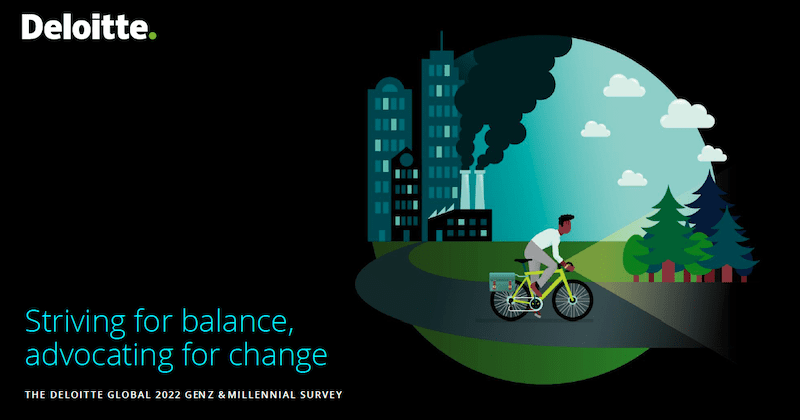Deloitte’s Global 2022 Gen Z and Millennial Report reveals some significant findings that business leaders will want to pay attention to. And we break it down for you right here, from hybrid work schedules to going green.
Ever found yourself wondering if anyone is actually monitoring how today’s workforce is coping with the various flavors of “unprecedented” that hit the news cycle every day? The answer is unequivocally “yes.” In fact, 2022 marks the 11th year that Deloitte, the largest professional services firm in the world, has undertaken their Global Gen Z and Millennial Survey, monitoring how younger workers are faring during a period unrivaled in modern memory for disruption, unrest and political polemics.
To take the global temperature of where this vital segment of the economy is at in various aspects of their lives and careers, Deloitte interviewed more than 25,000 subjects (14,808 Gen Zs, born between 1981 and 1996; 8,412 Millennials, born 1997 to 2012) from 46 countries worldwide.
The survey opens with an executive summary that lays out a challenging scenario marked by events such as the COVID-19 pandemic and geo-political unrest. It details how both populations understand the challenges they face and are fully engaged in the struggle to balance a desire for change with the demands of everyday life. In short, this population sees the writing on the wall and is meeting the current climate with notably creative pivots.

“The unprecedented circumstances of the past few years have prompted many people around the world to rethink their priorities, leading to the Great Resignation. This time of historic voluntary turnover presents significant opportunities for Millennials and Gen Zs,” write the survey authors. “The sustained workplace changes they’ve been asking for — including higher compensation, more flexibility, better work/life balance, increased learning and development opportunities, better mental health and wellness support, and a greater commitment from businesses to make a positive societal impact — are also the strategies that will help employers attract and retain talent.”
Employers take note.
The report goes into four key areas that were identified by participants as the most critical issues: Reassessing the Way We Work; the Workplace Mental Health Crisis; the Cost of Living and Financial Anxiety; and Advocating for Climate Change.
Each section includes timely insights illustrated by infographics and statistics to support a narrative that presents current issues not as insurmountable obstacles, but as on-ramps to change. The findings further serve as a de facto roadmap highlighting how Gen Z and Millennials are navigating today’s reality — and what employers and policymakers can do to support the changes the under-40 demographic wants for its work/life balance.
In that spirit, the report concludes with recommendations businesses and officials can employ to harness the productivity and aspirations of both groups. We summarized the findings below so you can take a quick skim, or for a deeper dive, here is the full report.
Reassessing the Way We Work

- The Great Resignation is going to be with us for a while: Although there was an increase in job loyalty from last year, four in 10 Gen Zs and nearly a quarter of Millennials say they would leave their job within two years (roughly one-third would do so without another job lined up, signaling significant job dissatisfaction).
- When it comes to what makes these groups choose an organization to work for, good work/life balance and learning and development opportunities are their top priorities.
- A strong majority of Gen Zs (75 percent) and Millennials (76 percent) prefer hybrid or remote work. Reasons cited include freeing up time for other pursuits, saving money, more time with family, easier to accomplish work tasks, and a positive impact on mental health.
Addressing the Workplace Mental Health Crisis

- High stress levels are definitely a thing, particularly in the Gen Z group, with 46 percent saying they are stressed or anxious much of the time. That number rises to 53 percent among women. Millennials stand at 38 percent and 41 percent for women specifically.
- The factors creating stress include worries about their long-term financial future (47 percent Gen Zs; 43 percent Millennials), day-to-day finances (42 percent Gen Zs; 39 percent Millennials), and family health and welfare (42 percent Gen Zs; 39 percent Millennials).
- More than half of respondents in both groups say their workplaces are taking the topic more seriously, but more has to be done to translate into real change.
Cost of Living and Financial Anxiety

- A vast majority (72 percent Gen Zs; 77 percent Millennials) agree that the gap between the richest and poorest people in their country is widening.
- Both groups have adapted over the last several years: Previously, health care and disease prevention were top concerns. Those have been replaced by the cost of living and climate change (29 percent and 24 percent, respectively, Gen Z; 36 percent and 25 percent, respectively, Millennials).
- A significant number of Gen Zs (43 percent) and Millennials (33 percent) have taken on either a full- or part-time job in addition to their primary job. The data shows that side hustles may be about more than just money, with additional reasons being the ability to hone new skills and tap into entrepreneurial ambitions.
Advocating for Climate Change

- Gen Zs and Millennials are doing their part — nine in 10 make an effort to protect the environment. In the near term, they are focused on small, everyday actions like buying organic foods. In the longer term, they plan actions such as buying an electric car or making their homes more sustainable.
- Both groups feel that governments and businesses overall need to do much more to fight climate change. Only 15 percent of Gen Zs and 14 percent of Millennials strongly agree businesses are doing enough, while 11 percent of Gen Zs and 13 percent of Millennials think their governments are highly committed.
- When it comes to environmental policies by their employers, both groups favor highly visible actions they can participate in (such as banning single-use plastics at the workplace) over less visible actions like committing to long-term net-zero greenhouse gas emissions.
Whether you’re running your own business or are part of an organization, we recommend taking a look at the full report. The takeaways are insightful and the price is right — a free download.




